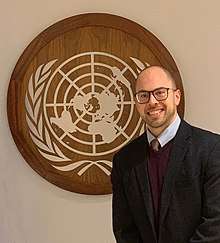John-Ross Rizzo
John-Ross (JR) Rizzo, M.D., M.S.C.I., is an American physician-scientist at NYU Langone Medical Center.[1]. He is serving as the Director of Innovation and Technology for the Department of Physical medicine and rehabilitation at Rusk Institute of Rehabilitation Medicine[2], with cross-appointments in the Department of Neurology[1] and the Departments of Biomedical & Mechanical and Aerospace Engineering New York University Tandon School of Engineering.[3] He is also the Associate Director of Healthcare for the NYU Wireless Laboratory in the Department of Electrical and Computer Engineering at New York University Tandon School of Engineering[4]. He leads the Visuomotor Integration Laboratory (VMIL), where his team focuses on eye-hand coordination, as it relates to acquired brain injury, and the REACTIV Laboratory (Rehabilitation Engineering Alliance and Center Transforming Low Vision), where his team focuses on advanced wearables for the sensory deprived and benefits from his own personal experiences with vision loss.
John-Ross Rizzo | |
|---|---|
 | |
| Nationality | American |
| Alma mater | New York University |
| Employer | NYU Langone Medical Center |
| Known for | Assistive technology, Eye–hand coordination |
| Website | JohnRoss Rizzo-NYU School of Medicine |
He is also the Founder and Chief Medical Advisor of Tactile Navigation Tools,[5] LLC, where he and his team work to disrupt the assistive technology space for those with visual impairments of all kinds, enhancing human capabilities. He partners with a number of industrial sponsors and laboratories throughout the country to help breakthrough new barriers in disability research and/or motor control.
Early life and education
As a young boy, he was diagnosed with Choroideremia, a congenital, X-linked, recessive disease of the retina and choroid, associated with nyctalopia and degenerative peripheral vision. It has deeply influenced his thinking about functional dependencies and his professional goals.
Rizzo completed his undergraduate degree at New York University Magna Cum Laude with an Honors Thesis in Neural science and a double minor in Chemistry and Psychology. He was a Dean's Scholar and also conferred the Founders Day Award. He completed his medical school training on an academic scholarship at New York Medical College Alpha Omega Alpha (Iota Chapter) Honors and placed in top contention for his medical student research in neuro-ophthalmology under the tutelage of Prof. Sansar Sharma. His residency was completed at the Rusk Institute of Rehabilitation Medicine at New York University School of Medicine, where we completed a Chief Year and was selected for multiple leadership positions. His fellowship was completed in clinical research through the Physician Scientist Training Program at New York University School of Medicine’s Clinical and Translational Science Institute (CTSI) under a grant from the NIH (NCATS) in partnership with Rusk and the NYU Center for Neural Science / Dept. of Psychology under Prof.Michael S. Landy.
Career
Since 2013 he has been a faculty member working on and creating teams that focus on a number of cutting-edge research foci: the Visuomotor Integration Laboratory (VMIL), focused on eye-hand coordination, as it relates to acquired brain injury (ABI), the REACTIV Laboratory (Rehabilitation Engineering Alliance and Center Transforming Low Vision), focuses on advanced wearables for the sensory deprived.[2]
His quest is to better understand how eye control intersects with hand control during eye-hand coordination after acquired brain injury (ABI) and what role vision and eye movements play in hand-focused motor recovery. As a secondary mission, he has and will continue to focus on leveraging technology in novel applications to better objectify accepted clinical measures, to assist in instrumenting the medical ecosystem to improve medical science, and to create innovative assistive technologies to help foster functional independence.
Awards
Rizzo has won awards for his work in disability research, particularly focused on the intersection of ocular motor and manual motor control and on assistive technology. He was awarded the Crain’s 40 under 40 award in New York Business for his medical devices, including his wearable technology.[6] In 2016, he was conferred the title of “Healthcare Re-writer” by Forbes and KPMG” (having conceptualized or worked on technologies that have the potential to massively transform healthcare).[7] Dr. Rizzo has also been featured in a number of lay articles and also featured in videos and press releases. In 2018, he was a highlighted speaker in NYU's TEDx “Re-Vision” Series.[8] in which he explains his life story and how he made turned his disability into a super power through the use of assistive technology and advanced wearables.[9]. In 2018, ACRM recognized John Ross Rizzo, for contributions to the field made during his early career work and he received the Deborah L. Wilkerson Early Career Award.[10].He was inducted into the Susan Daniels Disability Mentoring Hall of Fame that honors those who are making a significant difference in the lives of youth and adults with disabilities through mentoring and to raise awareness about the importance of mentoring for individuals with disabilities(Class2019).[11].
Grants and research
Rizzo research has been supported at the federal, state, municipal and private levels. He also works with a number of nonprofit organization (NPO) / foundations.
References
- "JohnRoss Rizzo". Med.nyu.edu.
- "VMIL & TTML - Rusk Rehabilitation". Med.nyu.edu. Retrieved 16 December 2018.
- "John-Ross Rizzo - NYU Tandon School of Engineering". Engineering.nyu.edu.
- "People - 5G & Beyond – NYU WIRELESS". Wireless.engineering.nyu.edu. Retrieved 16 December 2018.
- "Tactile Navigation Tools - Next Generation Assistive Technology". Tactilenavigationtools.com.
- "40 Under 40 - John Ross Rizzo". Crain's New York Business.
- Melin, Anders. "Hope In Sight For Visually Impaired". Forbes.com.
- "TEDxNYU: Re-Vision". Tedxnyu.com.
- "TEDxNYU".
- "EARLY CAREER OUTSTANDING MENTOR AWARD".
- "The Susan Daniels Disability Mentoring Hall of Fame".
External links
- at NYU Langone Medical Center
- Rizzo Google Scholar page